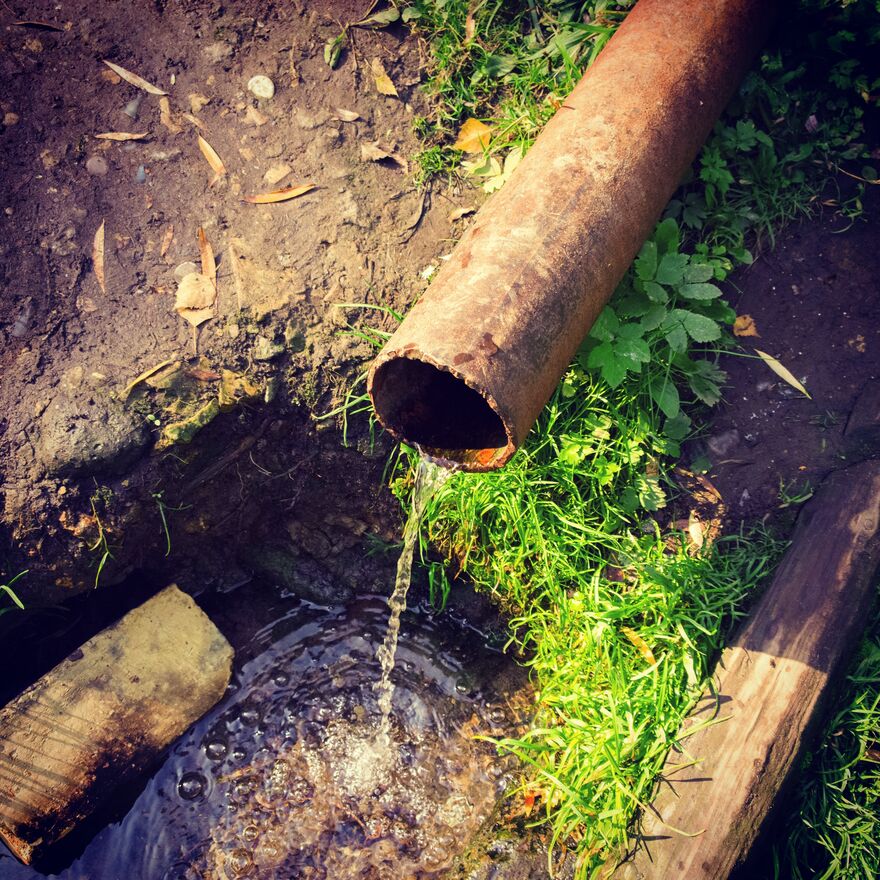
Septic tank discharges to surface water
How to comply with the new rules which come into force in 2020
If you own a property which has a septic tank that drains into a watercourse, then you need to know about the changes to the law coming into force in 2020. Septic tanks in England will no longer be permitted to discharge to surface water.
A septic tank settles the solids in wastewater and discharges the liquid waste to either the ground, via pipes in the sub-soil, or to surface water. Small sewage discharges are regulated by the Environment Agency because of their potential to contaminate groundwater supplies and surface water, polluting drinking water and causing harm to the natural environment.
In England, small discharges are regulated with a light touch. Most systems, including septic tanks, do not need to be registered or require consent.
Instead, they are regulated under what are known as the General Binding Rules for small sewage discharges (“the Rules”). The Rules were first introduced on 1 January 2015 and consist of a series of conditions and technical requirements specified by the Environment Agency, designed to protect water resources from pollution caused by small sewage discharges.
For a summary of the Rules applying to all small discharges (i.e. to the ground and to surface waters) please click here.
Currently, the Rules differ slightly depending on the method of drainage. Septic tanks that discharge into a drainage field in the ground, and small sewage treatment plants will not be affected by the new 2020 rules.
If you own a septic tank which discharges to a surface water, such as a drain, ditch, river, canal, stream, lake or any other type of watercourse, you must upgrade or replace the system by the deadline or you risk prosecution.
The government’s initial deadline for compliance – 1 January 2020 – appears to have been brought forward and, at the same time, slightly relaxed. Its latest guidance published on 25 October 2019 General binding rules: discharges to surface water states that discharges from septic tanks direct to a watercourse “are not allowed under the general binding rules”. However, despite use of the present tense, the guidance then tells owners to have alternative plans in place “within a reasonable timescale, typically 12 months”.
We suggest that you act now.
Your options
Owners have several options:-
a) Connect to a mains sewer, where available;
b) Install a drainage field so that the septic tank can discharge to the ground instead of surface water; or
c) Replace the septic tank with a small sewage treatment plant.
There are two further options but the Environment Agency does not appear to be encouraging owners to adopt them:-
a) Apply for a permit to discharge to a surface water: a permit will only be granted in exceptional circumstances; or
b) Use a septic tank conversion unit to upgrade the existing tank. You would need to check with the Agency that the unit will treat the discharge to a standard equivalent to a sewage treatment plant, and you will still need to apply for a permit.
Before commissioning any changes to your sewage system, you should ensure that:-
- You have planning permission (if required by your local planning authority);
- Any new equipment complies with the British Standard in force at the time of installation; and
- Your contractor is aware of and has agreed to comply with the relevant Building Regulations and the manufacturer’s installation instructions.
Difference between septic tanks that discharge to the ground and small sewage treatment plants.
A septic tank separates between 30-40% of the pollutants contained in sewage, retaining the solids for later removal and disposal elsewhere. This is known as ‘primary treatment’. The resulting liquid flows into a constructed drainage field where the remaining pollutants are removed by secondary biological treatment before it reaches any groundwater.
Treatment plants provide primary and secondary biological treatment in a single tank. Provided that they are operating correctly, they are more effective than septic tanks, converting between 80-95% of the pollutants in sewage into simpler, less polluting chemical substances.
There are a number of different products available and you should investigate your options carefully, bearing in mind that there are no public funds or grants available to upgrade septic tanks that currently drain to surface water.
If you have any queries about the new rules affecting septic tanks that currently drain into surface water, or if you want to know more about the regulation of small sewage discharges in general, please contact Sarah Keens or Deborah Caldwell.
The Howes Percival Commercial Property law team are experts in their field and provide invaluable advice and support. Contact us today to see how we can help you.
The information on this site about legal matters is provided as a general guide only. Although we try to ensure that all of the information on this site is accurate and up to date, this cannot be guaranteed. The information on this site should not be relied upon or construed as constituting legal advice and Howes Percival LLP disclaims liability in relation to its use. You should seek appropriate legal advice before taking or refraining from taking any action.
